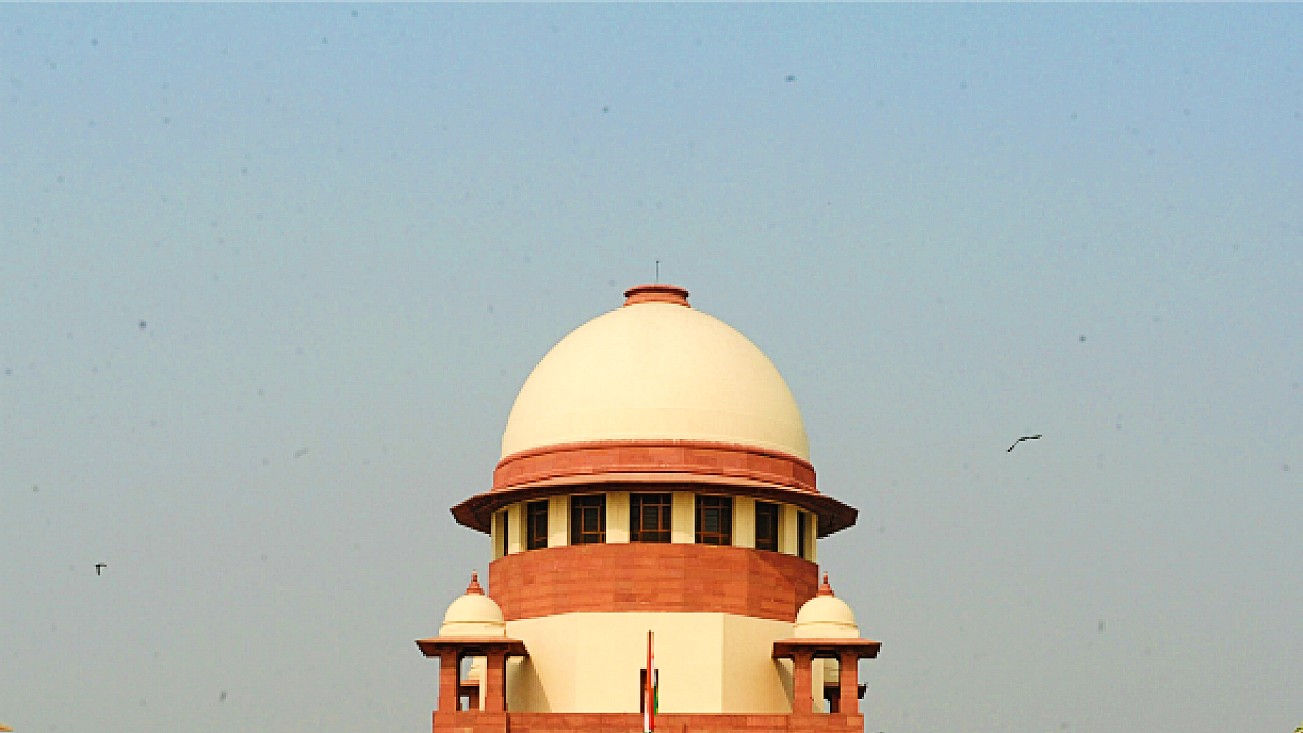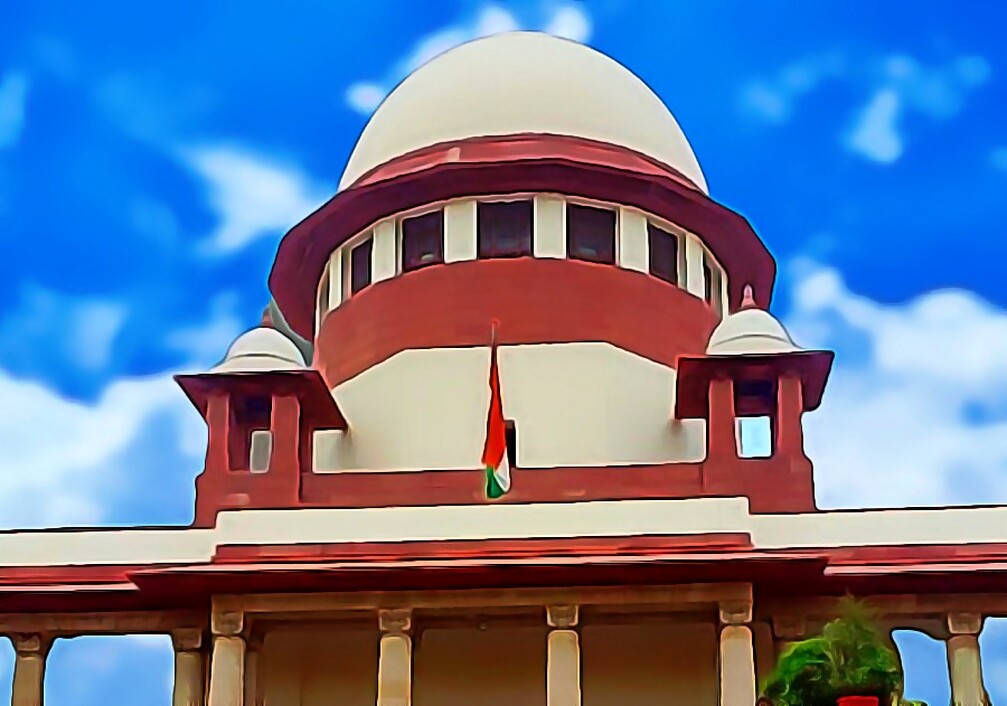HC graciously gifted forest land to private person who could not prove his title: Top Court allows State of Telangana's appeal, orders enquiry into lapses committed by Officers in filing collusive affidavits
Justices M.M. Sundresh & S.V.N. Bhatti [18-04-2024]

Read Order: THE STATE OF TELANGANA & ORS v. MOHD. ABDUL QASIM (DIED) PER LRS [SC- CIVIL APPEAL NO. 5001 OF 2024]
LE Correspondent
New Delhi, April 19, 2024: While setting aside an order passed by the Telangana High Court whereby a forest land was held to be owned by a private person, the Supreme Court has observed that it was a classic case where the officials of the State, who are expected to protect and preserve the forests in discharge of their public duties, clearly abdicated their role.
The factual background of the case was that a revision of survey and settlement of village Kompally took place. An application was stated to have been filed by Respondent No. 1 (Original Plaintiff), invoking Section 87 of the Andhra Pradesh (Telangana Area) Land Revenue Act, 1317 F, seeking rectification of survey error. It was so filed on the premise that the Plaintiff actually owned the suit land. This application did not surface for nearly a decade and a half, for the reasons known to the Plaintiff.
A notification was published, declaring the land, which was part of the earlier proceedings of the revenue department as reserved forest. It was done on the premise that the lands were forest lands and, therefore, they were accordingly declared as reserved forest. Strangely, the application so filed by the Plaintiff was rejected by the Revenue Authority. Despite the findings rendered, neither the Forest Department nor the Forest Settlement Officer was arrayed as a party to these proceedings before the revenue department. Thereafter, the Joint Collector, Warangal allowed the application of the Plaintiff. Realising that the said order will not give the Plaintiff benefit of any sort, he filed an application before the Government seeking denotification of the land declared as reserved forest', which was dismissed.
A suit was filed by the Plaintiff seeking a declaration of title and permanent injunction. The trial court while granting title to the plaintiff declined the incidental relief of injunction.
On appeal, the High Court reversed the said finding of the trial court qua the declaration, and confirmed the findings on injunction by dismissing the suit in toto. Ultimately, it was held that the property is a forest land. The High Court went ahead and held that the plaintiff had miserably failed to show his title to the suit property.
The District Forest Officer did not appear before the Committee and based upon a report submitted, it was held that the suit property was required to be excluded in favour of the plaintiff. The aforesaid decision was taken by the District Collector after the judgment of the First Appellate Court. The review came to be filed before another Judge. The impugned order was passed in the purported exercise of the power of review, by virtually reversing all the findings rendered in the appeal, while placing reliance upon evidence which on the face of it was inadmissible and, therefore, void from its inception, rendered by an authority which had absolutely no jurisdiction at all. In its 2021 review ruling, the High Court had reversed its earlier findings.
It was the case of the appellants that revenue records do not confer title. It was submitted that the High Court clearly exceeded its jurisdiction in review by entertaining a re-hearing and virtually acted as an appellate court. The Respondents did not satisfy the court on the title, which finding has not been touched.
On the other hand, the respondents contended that the proceedings before the Forest Settlement Officer had become final. Even the trial court held that the plaintiff had title. Once title is proved, possession has to follow.
The Division Bench of Justice M.M. Sundresh & Justice S. V. N. Bhatti, at the outset, observed, “It is a classic case where the officials of the State who are expected to protect and preserve the forests in discharge of their public duties clearly abdicated their role. We are at a loss to understand as to how the High Court could interfere by placing reliance upon evidence produced after the decree, at the instance of a party which succeeded along with the contesting defendant, particularly in the light of the finding that the land is forest land which has become part of reserved forest.”
According to the Top Court, there was a distinct lack of jurisdiction on two counts – one was with respect to an attempt made to circumvent the decree and, the second was in acting without jurisdiction. The land belonged to the Forest Department and therefore, Defendant No. 1 had absolutely no role in dealing with it in any manner. Proceeding under the A.P. Land Revenue Act, 1317 F. had no relevancy or connection with a concluded proceeding under the A. P. Forest Act. Thereafter, without any jurisdiction, an order was passed under Section 87, it noted.
Noticing the fact that the High Court on the earlier occasion had given a clear finding that even at the time of declaration under the A.P. Land Revenue Act, 1317 F, these lands were not shown as private lands by the defendant, among other factual findings, the Bench said, “It is indeed very strange that the High Court which is expected to act within the statutory limitation went beyond and graciously gifted the forest land to a private person who could not prove his title. While disposing of the first appeal, the High Court exercised its power under Order XLI Rule 22 of the CPC 1908 for partly reversing the trial court decree. Even otherwise, there were concurrent findings in so far as dismissal of the suit for injunction is concerned. In our considered view, the High Court showed utmost interest and benevolence in allowing the review by setting aside the well merited judgment in the appeal by replacing its views in all material aspects.”
It was also opined that the suit filed was not maintainable as the plaintiff had not challenged the proceedings under Section 15 of A. P. Forest Act. These had become final and conclusive in view of the express declaration provided under the statute in Section 16 of A. P. Forest Act. The Bench opined that the Plaintiff could not prove his title nor does there lie any relevance to the action taken under the A.P. Land Revenue Act, 1317 F. Furthermore, there was no specific challenge to the concluded proceedings under the A. P. Forest Act as the Plaintiff had merely asked for declaration of title and permanent injunction restraining the Defendants from interfering with possession.
The Bench also presented a constitutional perspective on the current environmental scenario and observed, “Human beings indulge themselves in selective amnesia when it comes to fathom the significance of forests…the protection of forests is in the interest of mankind, even assuming that the other factors can be ignored.”
Thus, allowing the appeal, the Bench set aside the impugned judgment and impose cost of Rs 5,00,000 each on appellants and respondents to be paid to the National Legal Services Authority (NALSA) within a period of two months
The Bench concluded the matter by stating, “The appellant State is free to enquire into the lapses committed by the officers in filing collusive affidavits before the competent court, and recover the same from those officers who are responsible for facilitating and filing incorrect affidavits in the ongoing proceedings.”
Sign up for our weekly newsletter to stay up to date on our product, events featured blog, special offer and all of the exciting things that take place here at Legitquest.




Add a Comment